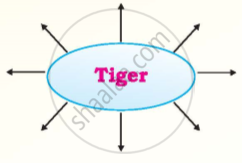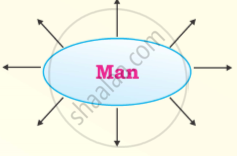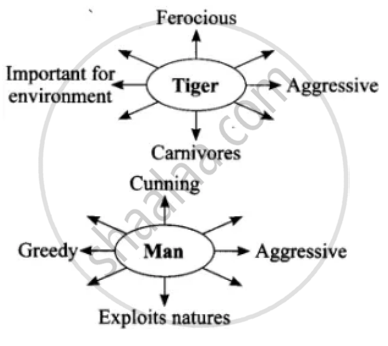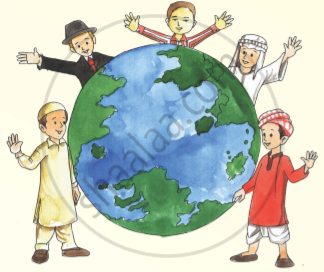Advertisements
Advertisements
प्रश्न
In pairs discuss the qualities and characteristics of the tiger and man. Complete the web charts. 

उत्तर

APPEARS IN
संबंधित प्रश्न
On the basis of your understanding of the poem, answer the following questions by ticking the correct choice
The poem is narrated in the first person by the brook. This figure of speech is
Complete the following paragraph about the theme of the play using the clues given in the box below. Remember that there are more clues given than required.
sell, buying, house, enthusiastic, comes, 200 thousand francs, taking, favour, get, sleeps, money, 300 thousand francs, unhappy, in-laws, walks in strikes, keep
Juliette, the owner of a Villa wants to ____________ it as she is in need of _____________. Moreover, she is not in _____________ of the house. Jeanne and Gaston, a couple visit her with the aim of _____________ the Villa. While Jeanne is __________ about buying, Gaston detests the idea as he does not want his
___________ in that house. Also, he finds the asking price of ____________ to be expensive. When Jeanne and Juliette go around the house, another customer ____________and starts talking to Gaston ___________him to be Juliette's husband. Gaston ____________ a deal with the customer by which he is able to give ____________ to the owner and _______________ one thousand francs for himself.
Read the following extracts and answer the question that follow by choosing
the .correct options.
'While you were upstairs, I have been thinking a lot about your Papa and Mamma.
(a) What is the discrepancy between what Gaston said earlier and what he says now?
(i) Earlier he did not want Juliette's parents to stay with them but now he is
showing concern for them.
(ii) Earlier he wanted Juliette's parents to stay with them but now he does not want
them to come over.
(iii) Earlier he wanted to buy a house for them but how he wants them to come and
stay in their villa.
(iv) Earlier he stayed in Juliette's parents' villa but now he wants them to stay with
him and Juliette.
(b) What does the above statement reveal about Gaston's character?
(i) he is selfish.
(ii) he is an opportunist.
(iii) he is a caring person.
(iv) he is a hypocrite.
The term irony refers to a discrepancy, or disagreement, of some sort. The
discrepancy can be between what someone says and what he or she really
means. on verbal irony. The discrepancy can be between a situation that one
would logically anticipate or that would seem appropriate and the situation that
actually develops or situational irony. The discrepancy can even be between the
facts known to a character and the facts known to us, the readers or audience or
dramatic irony.
Working in groups of four complete the following table. Find instances of irony from the play
and justify them.
| Extract | Justification |
| I believe you want to convert me; save my soul, don’t you call it? Well, it’s no good………. see? I don’t want any damned religion. ● ________________________________ ●_________________________________ |
Later, the convict says, “its a queer thing to ask, but-could you, would you bless me before I go.” ●______________________________ ●______________________________ |
| ● Why the devil do you leave the window unshuttered and the door unbarred so that anyone can come in? ’ ●__________________________________ ●__________________________________ |
If the door had been barred the convict couldn’t have entered the house. ______________________________ ●______________________________ |
| ● My mother gave them to me on………………………. on her death bed just after you were bom, and…………….. and she asked me to keep them in remembrance of her, so I would like to keep them. ● _______________________________ ● _______________________________ |
Later he hands the convict the candlesticks and tells him to start a new life. ● _________________________ ● __________________________ |
Complete the introduction given below to the story The Story Teller by Saki (H.H. Munro), by using ‘a’ ‘art’ or ‘the’’:
The afternoon was hot, and so was (a)______ railway carriage. (b)_______ next stop was at Templecombe, nearly (c)______ hour ahead. In the carriage were a small girl, (d)______ smaller girl, and a small boy. (e)________ aunt belonging to (f)______ children sat in (g)_________ comer seat, and in (h)_______ further comer seat on (i)______ opposite side, was a man who was a stranger to them, but (j)_____ small girls and the small boys were (k)_________ ones who filled the compartment. The children chatted on and on to their aunt, like (l)____ housefly that refuses to be put off. Most of the aunt’s remarks seemed to begin with “Don’t”, and nearly all of (m)______ children’s remarks began with “Why?”
Choose a suitable word from the options given and complete the story from Tunisia.
A weary traveller stopped at a Bedouin’s tent and asked for shelter for the night. Without (a)_______ delay, the man killed (b) _______chicken and handed it to (c)_______ wife for (d)___________ guest’s supper. As the woman stirred the meat in (e) _______ copper cooking pot, she smelled the rich steam and could not resist tasting (f)________ of the meat and soup, to see if it was soft and tasty. But mouthful followed mouthful, and there wasn’t (g)__________chicken left but for the neck piece, which she gave to her little son to nibble. The boy found it so tasty that he whined, “Give me (h)_______ more chicken, mother!” The woman slapped the little boy and scolded him: “It’s a shameful habit (i)______ father taught you, enough of it, I tell you!” On the (j) _______ side of the wooden hanging which screened the woman’s part of the tent from the rest, the traveller overheard them. “What habit has (k)______ father taught (l) _______ child?” he asked curiously. “Oh,” said the woman, “whenever a guest arrives at (m)_______ tent, he cuts off his ears and roasts them over the fire for (n)______ son to eat.” Making not a sound, the traveller picked up (o)_______ shoes and ran.
| (a) (i) no any (ii) little (iii) any (iv) no |
| (b) (i) a few (ii) some (iii) few (iv) a |
| (c) (i) his (ii) her (iii) their (iv) there |
| (d) (i) the (ii) a (iii) theirs (iv) their |
| (e) (i) her (ii) hers (iii) the (iv) an |
| (f) (i) some (ii) few (iii) a few (iv) more |
| (g) (i) any (ii) some (iii) a few (iv) few |
| (h) (i) little (ii) a little (iii) a few (iv) some |
| (i) (i) hers (ii) yours (iii) their (iv) his |
| (j) (i) another (ii) another (iii) other (iv) one |
| (k) (i) hers (ii) her (iii) him (iv) his |
| (l) (i) a (ii) an (iii) the (iv) x |
| (m) (i) x (ii) our (iii) ours (iv) their |
| (n) (i) their (ii) his (iii) him (iv) our |
| (o) (i) her (ii) his (iii) our (iv) x |
Work in pairs. Tell your partner what you are not able to do now because of the fast-paced life.
e.g. I could play in the open ground but now I can’t.
I could visit my aunt on weekends but …………
In groups of four prepare a questionnaire for a pilot who has survived the Bermuda Triangle. Use the hints given below.
- Radar normal
- No disturbances
- Sudden communication failure
- Strange occurrence (use any of the theories or myths you have just read about)
Probability
The following statements express varying degrees of certainty. Look at the underlined modals in each of the statements. Then number the sentences in order of certainty. Mark the sentence No. 1 if it is most likely certain and the least likely as no. 5.
(a) The lady in the formal attire may be Mr. Chawla’s secretary. (a) ___________
(b) The foreigners accompanying him could be the (b) ___________ newly appointed interpreters
(c) The man in the safari talking to someone on the (c) ____________ cell phone mustbe Mr. Chawla.
(d) Mr. Chawla will be the chief guest. (d) ___________
(e) The people following him might be from the media. (e) ___________
The following are the lyrics of a famous song. Complete it by filling in the missing letters (mostly vowels).
There c_m_s a time.
When we h __ d a certain call
When the w __ ld must come t_g_th_r
As one
There are p _ _ple d_ing
Oh and it's time
To l_nd a h_nd to l_fe
The gr __ test gift of all
Wec_n't go on 
Pr_t_nding day by day
Th_t s_me_ne, somewhere
Will s __ n make a change
We are all a p __ t of
God's gr __ t big f_m_ly
And thetr_th,youknow
L_ ve is all we n __ d
W_ are the world
We are the ch_ldr_n
We are the _nes
To m __ e a br ___ ter day
So l_t's st __ t g_ving
There's a ch __ ce we're m_king
We're s_ving our own l_ves
It's tr __ wemake a b_tterday
J_st y __ andme
W _11, send them your h __ rt
So they kn__ that s_me_ne cares
And th __ r lives wll be str_nger
And fr __
As G_d has sh_wn us
By t __ ning stone to br __ d
And so we _11 must
L-nd a h_lping h_nd
We are the world ...
We're d_wn and __ t
And there s __ ms no h_pe at all
Butify __ justbel __ ve
There's no w_y we can f_ll
Ohyes, let's r __ lise
That ch_nge can only c_me
When we st_nd t_g_ther
As one
We are the world ...
